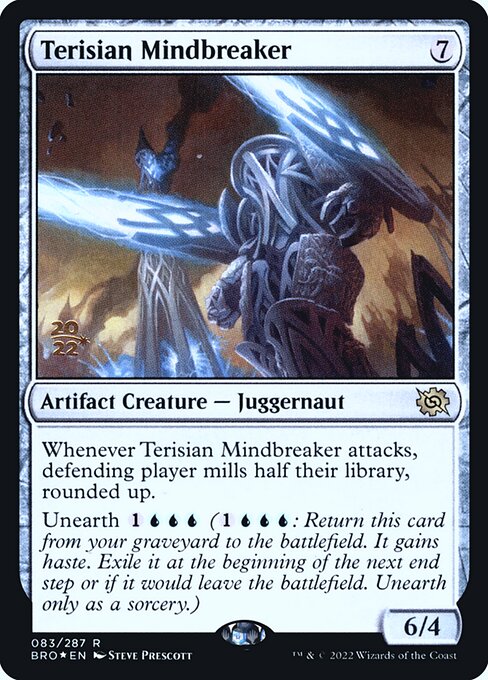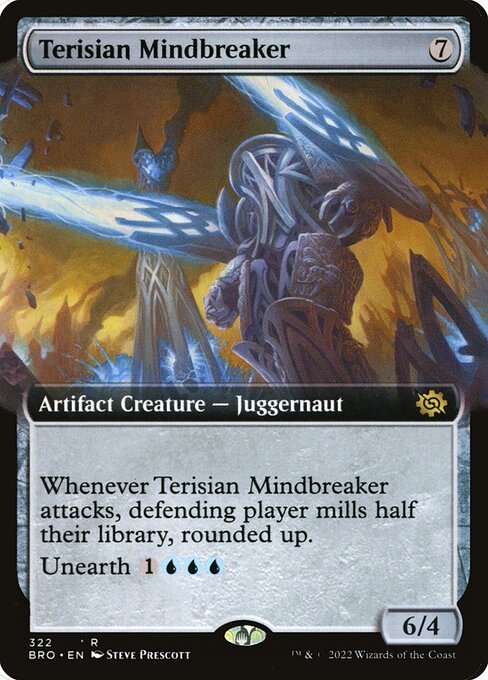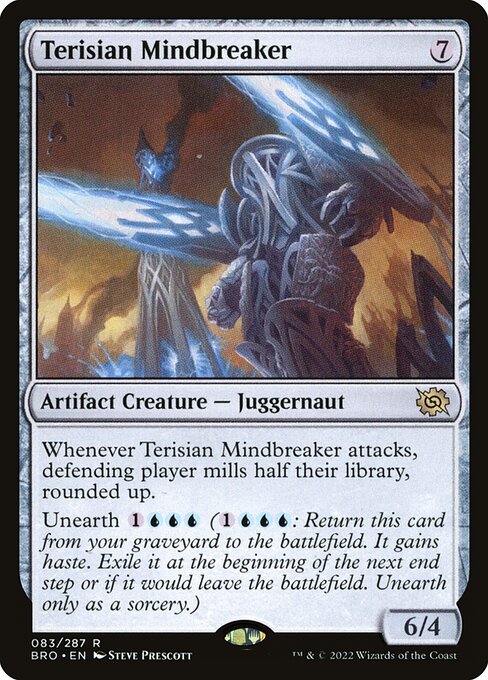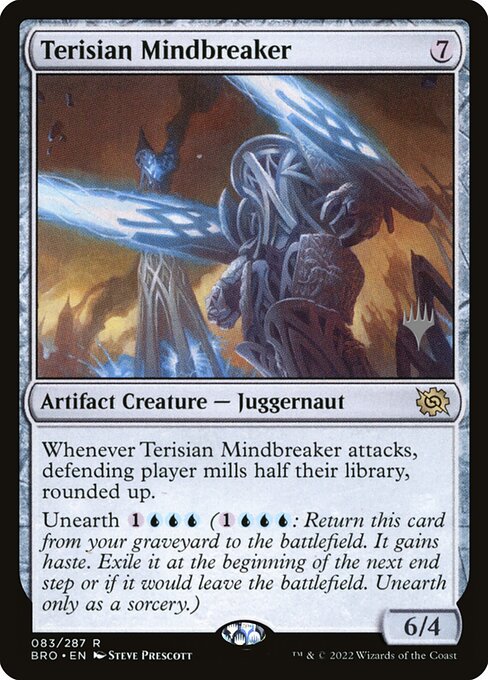Terisischer Gedächtnisschinder
Artefaktkreatur — Juggernaut
Immer wenn der Terisische Gedächtnisschinder angreift, millt der verteidigende Spieler die Hälfte seiner Bibliothek, aufgerundet.
Exhumieren (: Bringe diese Karte aus deinem Friedhof ins Spiel zurück. Sie erhält Eile. Schicke sie zu Beginn des nächsten Endsegments, oder falls sie das Spiel verlassen würde, ins Exil. Spiele Exhumieren wie eine Hexerei.)
Exhumieren (: Bringe diese Karte aus deinem Friedhof ins Spiel zurück. Sie erhält Eile. Schicke sie zu Beginn des nächsten Endsegments, oder falls sie das Spiel verlassen würde, ins Exil. Spiele Exhumieren wie eine Hexerei.)
6/4
standard
future
historic
gladiator
pioneer
explorer
modern
legacy
pauper
vintage
penny
commander
brawl
alchemy
paupercommander
duel
oldschool
premodern
Rulings
If a permanent returned to the battlefield with unearth would leave the battlefield for any reason, it’s exiled instead—unless the spell or ability that’s causing the permanent to leave the battlefield is actually trying to exile it! In that case, it succeeds at exiling it. If that spell or ability later returns the card to the battlefield (as Static Net might, for example), the permanent card will return to the battlefield as a new object with no relation to its previous existence. The unearth effects will no longer apply to it.
Unearth grants haste to the permanent that’s returned to the battlefield (even if it’s not a creature card). However, neither of the “exile” abilities is granted to that permanent. If that permanent loses all its abilities, it will still be exiled at the beginning of the next end step, and if it would leave the battlefield, it is still exiled instead.
At the beginning of the next end step, a permanent returned to the battlefield with unearth is exiled. This is a delayed triggered ability, and it can be countered by effects such as Defabricate that counter triggered abilities. If the ability is countered, the permanent will stay on the battlefield and the delayed triggered ability won’t trigger again. However, the replacement effect will still exile the permanent if it eventually leaves the battlefield.
If you activate a card’s unearth ability but that card is removed from your graveyard before the ability resolves, that unearth ability will do nothing as it resolves.
If you attack the same player with two Terisian Mindbreakers, that player will mill half their library as the first Mindbreaker’s ability resolves. Then they will mill half of what remains in their library as the second Mindbreaker’s ability resolves. They do not mill their entire library unless their library only had three or fewer cards to begin with.
Activating a card’s unearth ability isn’t the same as casting that card. The unearth ability is put on the stack, but the card is not. Spells and abilities that interact with activated abilities (such as Defabricate’s second mode) will interact with unearth, but spells and abilities that interact with spells (such as Scatter Ray) will not.
Unearth grants haste to the permanent that’s returned to the battlefield (even if it’s not a creature card). However, neither of the “exile” abilities is granted to that permanent. If that permanent loses all its abilities, it will still be exiled at the beginning of the next end step, and if it would leave the battlefield, it is still exiled instead.
At the beginning of the next end step, a permanent returned to the battlefield with unearth is exiled. This is a delayed triggered ability, and it can be countered by effects such as Defabricate that counter triggered abilities. If the ability is countered, the permanent will stay on the battlefield and the delayed triggered ability won’t trigger again. However, the replacement effect will still exile the permanent if it eventually leaves the battlefield.
If you activate a card’s unearth ability but that card is removed from your graveyard before the ability resolves, that unearth ability will do nothing as it resolves.
If you attack the same player with two Terisian Mindbreakers, that player will mill half their library as the first Mindbreaker’s ability resolves. Then they will mill half of what remains in their library as the second Mindbreaker’s ability resolves. They do not mill their entire library unless their library only had three or fewer cards to begin with.
Activating a card’s unearth ability isn’t the same as casting that card. The unearth ability is put on the stack, but the card is not. Spells and abilities that interact with activated abilities (such as Defabricate’s second mode) will interact with unearth, but spells and abilities that interact with spells (such as Scatter Ray) will not.
Rulings
If a permanent returned to the battlefield with unearth would leave the battlefield for any reason, it’s exiled instead—unless the spell or ability that’s causing the permanent to leave the battlefield is actually trying to exile it! In that case, it succeeds at exiling it. If that spell or ability later returns the card to the battlefield (as Static Net might, for example), the permanent card will return to the battlefield as a new object with no relation to its previous existence. The unearth effects will no longer apply to it.
Unearth grants haste to the permanent that’s returned to the battlefield (even if it’s not a creature card). However, neither of the “exile” abilities is granted to that permanent. If that permanent loses all its abilities, it will still be exiled at the beginning of the next end step, and if it would leave the battlefield, it is still exiled instead.
At the beginning of the next end step, a permanent returned to the battlefield with unearth is exiled. This is a delayed triggered ability, and it can be countered by effects such as Defabricate that counter triggered abilities. If the ability is countered, the permanent will stay on the battlefield and the delayed triggered ability won’t trigger again. However, the replacement effect will still exile the permanent if it eventually leaves the battlefield.
If you activate a card’s unearth ability but that card is removed from your graveyard before the ability resolves, that unearth ability will do nothing as it resolves.
If you attack the same player with two Terisian Mindbreakers, that player will mill half their library as the first Mindbreaker’s ability resolves. Then they will mill half of what remains in their library as the second Mindbreaker’s ability resolves. They do not mill their entire library unless their library only had three or fewer cards to begin with.
Activating a card’s unearth ability isn’t the same as casting that card. The unearth ability is put on the stack, but the card is not. Spells and abilities that interact with activated abilities (such as Defabricate’s second mode) will interact with unearth, but spells and abilities that interact with spells (such as Scatter Ray) will not.
Unearth grants haste to the permanent that’s returned to the battlefield (even if it’s not a creature card). However, neither of the “exile” abilities is granted to that permanent. If that permanent loses all its abilities, it will still be exiled at the beginning of the next end step, and if it would leave the battlefield, it is still exiled instead.
At the beginning of the next end step, a permanent returned to the battlefield with unearth is exiled. This is a delayed triggered ability, and it can be countered by effects such as Defabricate that counter triggered abilities. If the ability is countered, the permanent will stay on the battlefield and the delayed triggered ability won’t trigger again. However, the replacement effect will still exile the permanent if it eventually leaves the battlefield.
If you activate a card’s unearth ability but that card is removed from your graveyard before the ability resolves, that unearth ability will do nothing as it resolves.
If you attack the same player with two Terisian Mindbreakers, that player will mill half their library as the first Mindbreaker’s ability resolves. Then they will mill half of what remains in their library as the second Mindbreaker’s ability resolves. They do not mill their entire library unless their library only had three or fewer cards to begin with.
Activating a card’s unearth ability isn’t the same as casting that card. The unearth ability is put on the stack, but the card is not. Spells and abilities that interact with activated abilities (such as Defabricate’s second mode) will interact with unearth, but spells and abilities that interact with spells (such as Scatter Ray) will not.
Votre collection ? vos decks ?
Envie de gérer votre collection et/ou créer des decks ?



 0
0
 0.44€
0.44€

